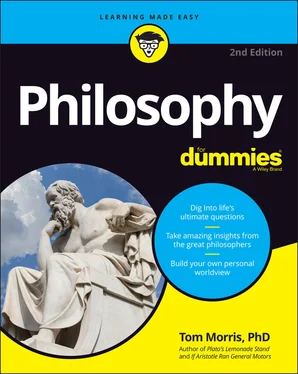Tom Morris - Philosophy For Dummies
Здесь есть возможность читать онлайн «Tom Morris - Philosophy For Dummies» — ознакомительный отрывок электронной книги совершенно бесплатно, а после прочтения отрывка купить полную версию. В некоторых случаях можно слушать аудио, скачать через торрент в формате fb2 и присутствует краткое содержание. Жанр: unrecognised, на английском языке. Описание произведения, (предисловие) а так же отзывы посетителей доступны на портале библиотеки ЛибКат.
- Название:Philosophy For Dummies
- Автор:
- Жанр:
- Год:неизвестен
- ISBN:нет данных
- Рейтинг книги:4 / 5. Голосов: 1
-
Избранное:Добавить в избранное
- Отзывы:
-
Ваша оценка:
- 80
- 1
- 2
- 3
- 4
- 5
Philosophy For Dummies: краткое содержание, описание и аннотация
Предлагаем к чтению аннотацию, описание, краткое содержание или предисловие (зависит от того, что написал сам автор книги «Philosophy For Dummies»). Если вы не нашли необходимую информацию о книге — напишите в комментариях, мы постараемся отыскать её.
Philosophy For Dummies
Philosophy For Dummies
Philosophy For Dummies — читать онлайн ознакомительный отрывок
Ниже представлен текст книги, разбитый по страницам. Система сохранения места последней прочитанной страницы, позволяет с удобством читать онлайн бесплатно книгу «Philosophy For Dummies», без необходимости каждый раз заново искать на чём Вы остановились. Поставьте закладку, и сможете в любой момент перейти на страницу, на которой закончили чтение.
Интервал:
Закладка:
To put it as simply as possible, philosophical skeptics want to ask why you believe what you believe. They want to know why you think you know the things you claim to know. They will ask you to investigate how you can have the knowledge you assert. And the particular way they choose to ask these questions can shed considerable new light on the foundations for all human beliefs and all the knowledge claims ever made.
In order to introduce the questions the skeptic urges people to ask, it will be useful to start off by making some simple distinctions. All beliefs ever held can be divided into three nonexclusive categories. This is a list of those simple categories and will be explained with examples in Table 5-1:
Past Oriented: Beliefs about the past
Present Oriented: Beliefs about the present
Future Oriented: Beliefs about the future
TABLE 5-1Examples of Three Belief Categories
| Past Oriented | Present Oriented | Future Oriented |
|---|---|---|
| I believe Socrates taught Plato and Plato taught Aristotle. | I believe many nations are having economic trouble. | I believe global warming will raise ocean levels. |
| I believe that America asserted its independence in 1776. | I believe my investments are doing well, despite ups and downs. | I believe Germany will remain a democracy. |
| I believe my father fought in World War II. | I believe my wife is gardening now and is enjoying her time outside. | I believe that technology will continue to alter culture. |
| I believe I had toast for breakfast today. | I believe it’s sunny outside. | I believe you’ll eventually enjoy reading this book. |
Philosophical skeptics have some simple questions to ask, in two ways. First, they question the reliability of the sources for any beliefs concerning things past, present, and future. Then they raise even more radical questions with crazy-sounding hypotheses about each of these categories of belief. These two types of questions, or inquiries, can be called source skepticism and radical skepticism , which will be explained in the following sections.
The questions of source skepticism
What are the distinctive sources for your beliefs about the past? Most of the beliefs you have about the past come to you through the testimony of other people. You weren’t present at the signing of the Declaration of Independence. You didn’t witness firsthand the events of the American Civil War. You have been told about these things by sources you take to be reliable.
The testimony of others is generally the main source of your beliefs about the past. But sometimes you were there. Things you have experienced directly, you later have access to through the means of memory. The second distinctive source of your beliefs about the past is then memory. Of course, memory also mediates past first-hand experience into the present.
GOOD MIND, BAD MEMORY
Even very smart people often have terrible memories. I once walked across campus at the University of Notre Dame with a visiting philosopher from Oxford, a notoriously eccentric individual who had the strangest walk I had ever seen. He bobbed up and down as he strode full stretch, and yet when he came to a crossing of sidewalks, he switched instantly to a tiny stepping run, knees high and arms tight to his sides. In the midst of our animated philosophical conversation, I suddenly realized that I was face to face with something out of Monty Python’s Ministry of Silly Walks. I was utterly astonished at the sight, as I nearly breathlessly tried to keep up with this gymnastic, fast-paced dance of jog and bob, while thinking logically about arguments for the existence of God.
After ten minutes of this odd and aerobic theorizing, the eminent professor tried mightily to remember the name of one of his best friends and closest colleagues at Oxford, a don known as even more eccentric, with whom he had worked for many years. He wanted to recommend the man’s book to me, but for the life of him could not recall his friend’s name. Finally he sputtered, “You know, you know, the chap who walks so funny!” True story. As our often-quoted friend Montaigne realized, “The memory represents to us not what we choose but what it pleases.”
E.B. White articulated the phenomenon of very smart people with bad memories and other eccentricities well when he said, “Genius is more often found in a cracked pot than in a whole one.” If you doubt my veracity here, go to any major college or university and venture into the parking lot where the math faculty members park their cars. Arrive at about five o’clock in the afternoon, at the end of the day, and watch them look for their automobiles. It’s quite a sight.
Some people think that physical evidence is an independent third source for beliefs about the past. But whether it consists of fossilized footprints in stone or a videotape of an event, it is always presented to us now by our own sense experience, and moments later by memory, or else by sense experience, augmented with testimony and memory, first, that it is what it is (a fossil or footprint); second, that it is authentic and not faked; and third, concerning what it means. So because of its dependence on the reliability of these other sources, you don’t have to treat physical evidence as a third source category.
All your beliefs about the past depend on testimony or memory, or both, as well as on the original sense experience that led to your current access to that firsthand evidence, or secondhand report. The skeptic wants to ask a simple and yet penetrating general question. “How do we know that any of the sources of our beliefs are ever reliable?” But you can take it a step at a time. It’s useful to begin with beliefs about the past. The skeptic asks, “How do we know that memory or testimony is ever reliable?”
Memory
How do you know that the mental function of memory is ever reliable? How do you know that it ever gives you trustworthy representations of the past, or true beliefs? Notice that the question here is not whether memory is always reliable, or even trustworthy a large portion of the time. Most people will admit that it’s not the utterly dependable thing it typically purports to be. After all, “Memory is the thing you forget with,” at least according to this telling admission by the journalist Stuart Alexander Chase.
But the question is not whether memory is infallible or even mostly reliable. The skeptic wants to know whether human memory is ever reliable at all. This may seem like a silly question to ask. But watch what happens when you try to answer.
How do you know that memory is ever reliable? Well, you might answer that at least you know that your memory is often reliable. But how do you know even that? Simple. You can recall many times in the past when you seemed to remember parking in a particular place, and there the car in fact was. You may recall many times remembering where you put your phone, and you were right. It was indeed in that place you recalled.
 But wait a second. If that’s how you justify ever relying on memory, by appealing to your memory of past success and saying that it has sometimes been reliable in the past, you are relying on memory to justify memory, and so you are engaging in unhelpfully circular reasoning , reasoning that just assumes the truth of the thing you are trying to prove. That is to say, you have not yet produced a single shred of untainted evidence for what needed such evidence.
But wait a second. If that’s how you justify ever relying on memory, by appealing to your memory of past success and saying that it has sometimes been reliable in the past, you are relying on memory to justify memory, and so you are engaging in unhelpfully circular reasoning , reasoning that just assumes the truth of the thing you are trying to prove. That is to say, you have not yet produced a single shred of untainted evidence for what needed such evidence.
Интервал:
Закладка:
Похожие книги на «Philosophy For Dummies»
Представляем Вашему вниманию похожие книги на «Philosophy For Dummies» списком для выбора. Мы отобрали схожую по названию и смыслу литературу в надежде предоставить читателям больше вариантов отыскать новые, интересные, ещё непрочитанные произведения.
Обсуждение, отзывы о книге «Philosophy For Dummies» и просто собственные мнения читателей. Оставьте ваши комментарии, напишите, что Вы думаете о произведении, его смысле или главных героях. Укажите что конкретно понравилось, а что нет, и почему Вы так считаете.












